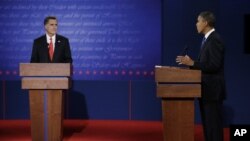DENVER —
Every four years, millions of Americans turn on their TV's to watch the major party candidates for president do battle. The televised presidential debates offer a chance for American voters to see them on the same stage. Modern debates are political theater -- part hype and part show business.
"Mr. President, as president, you're entitled to your own airplane and your own house but not your own facts." Mitt Romney quipped during the face to face clash between himself and President Barack Obama, who has a slight lead in the polls.
But outside the theater where the debate was being held, there was a party. The University of Denver called it "Debate Fest". After months of classes on politics and presidential debates, students enjoyed the national spotlight. "Debate Fest" participants enjoyed performers, who shared the stage with social media -- a wall of tweets.
One hundred lucky students had their names drawn in a lottery where the prize was a chance to sit inside the debate hall. Doctoral student Catherine Orsborn was one of the participants.
“I'm interested to see if Romney can shift focus of the debate," she said.
Massive chain link fences marked the debate perimeter and police patrol the entrances.
Inside, the university's hockey rink was transformed into a debate hall. Seven thousand seats were removed to make room for the massive stage, to make space for the media, and for extra security. That left only 1,000 seats for an audience.
Beforehand, stand-ins for the president and Romney helped technicians get audio and lighting just right. Backstage there was a filing center where 3,000 journalists watched and wrote their stories - 700 of them from foreign countries. Wessel de Jong, a correspondent for Dutch Public Broadcasting, said his viewers in the Netherlands would stay up all night to watch the U.S. Debate.
“United States is some kind of laboratory I think for politics in general," he explained. "So many politicians in the Netherlands just look at what's being done here. Right wing politicians, you see them copying tea party strategies. It's a big inspiration -- what's going on here.”
Afterwards, there was the organized chaos known as "Spin Alley", which has become a fixture of American presidential debates.
"The President couldn't justify his positions," one person said.
"Mitt Romney's having trouble in this campaign," opined another.
The campaigns sent advocates to Denver to tell journalists who they thought won the debate. Political insiders call it a "spin" of the national discussion and voters perceptions.
But in the end, it's the 50 million viewers watching on TV and on the internet who will decide if this first debate, or the other presidential and vice presidential debate will sway their votes.
"Mr. President, as president, you're entitled to your own airplane and your own house but not your own facts." Mitt Romney quipped during the face to face clash between himself and President Barack Obama, who has a slight lead in the polls.
But outside the theater where the debate was being held, there was a party. The University of Denver called it "Debate Fest". After months of classes on politics and presidential debates, students enjoyed the national spotlight. "Debate Fest" participants enjoyed performers, who shared the stage with social media -- a wall of tweets.
One hundred lucky students had their names drawn in a lottery where the prize was a chance to sit inside the debate hall. Doctoral student Catherine Orsborn was one of the participants.
“I'm interested to see if Romney can shift focus of the debate," she said.
Massive chain link fences marked the debate perimeter and police patrol the entrances.
Inside, the university's hockey rink was transformed into a debate hall. Seven thousand seats were removed to make room for the massive stage, to make space for the media, and for extra security. That left only 1,000 seats for an audience.
Beforehand, stand-ins for the president and Romney helped technicians get audio and lighting just right. Backstage there was a filing center where 3,000 journalists watched and wrote their stories - 700 of them from foreign countries. Wessel de Jong, a correspondent for Dutch Public Broadcasting, said his viewers in the Netherlands would stay up all night to watch the U.S. Debate.
“United States is some kind of laboratory I think for politics in general," he explained. "So many politicians in the Netherlands just look at what's being done here. Right wing politicians, you see them copying tea party strategies. It's a big inspiration -- what's going on here.”
Afterwards, there was the organized chaos known as "Spin Alley", which has become a fixture of American presidential debates.
"The President couldn't justify his positions," one person said.
"Mitt Romney's having trouble in this campaign," opined another.
The campaigns sent advocates to Denver to tell journalists who they thought won the debate. Political insiders call it a "spin" of the national discussion and voters perceptions.
But in the end, it's the 50 million viewers watching on TV and on the internet who will decide if this first debate, or the other presidential and vice presidential debate will sway their votes.




